A Lifelong Journey with ADHD: A Tapestry of Challenges and Triumphs
Oct 12, 2024
Living with Attention-Deficit/Hyperactivity Disorder (ADHD) is akin to navigating life with a unique set of lenses, shaping perceptions, experiences, and interactions from childhood to adulthood. It's a journey marked by both challenges and triumphs, a tapestry woven with threads of hyperfocus and distractibility, impulsivity and creativity, frustration and resilience.
This exploration delves into the lived experiences of individuals with ADHD across the lifespan, drawing upon insights from therapists, counsellors, life coaches, and individuals themselves. By understanding the neurological underpinnings of ADHD and embracing the concept of neurodiversity, we can move beyond simplistic labels and appreciate the multifaceted nature of this often-misunderstood condition.
Childhood: A World of Vivid Sensations and Shifting Sands
For children with ADHD, the world can be an exhilarating yet overwhelming place. Their brains, often described as having "the power of a Ferrari engine but with bicycle-strength brakes", are wired for heightened sensitivity to their surroundings. Sensory input – sights, sounds, smells, textures – floods their senses, making it difficult to filter and prioritize information.
Picture a child with ADHD in a bustling playground. Swings soar through the air, children's laughter echoes, the scent of freshly cut grass fills the air, and a nearby lawnmower hums – each sensation competes for their attention. While other children might seamlessly navigate this sensory landscape, a child with ADHD may struggle to process and make sense of it all. This can lead to:
-
Distractibility and Difficulty Focusing: Instructions from a playmate might get lost in the cacophony, and a captivating game of tag might be abandoned mid-chase as a brightly coloured butterfly flits across their path.
-
Impulsivity and Emotional Outbursts: The ability to pause, think, and then act is still developing, often leading to impulsive actions. A coveted toy snatched from another child, a sudden outburst of anger when a tower of blocks topples over – these actions stem from neurological differences, not wilful disobedience.
-
Misinterpretations and Misunderstandings: Their boundless energy, difficulty following rules, or emotional outbursts may be misconstrued as naughtiness or defiance. A child told repeatedly to "sit still" or "pay attention" might internalize these messages, impacting their self-esteem and sense of belonging.

It's crucial during these formative years to recognize that these behaviours are not intentional choices but rather reflections of the developing ADHD brain. Building supportive environments where sensory input is managed, clear expectations are set, and patience and understanding are abundant can make a world of difference.
Adolescence: Navigating Social Labyrinths and Mounting Pressures
As children with ADHD transition into adolescence, social dynamics become increasingly complex, and academic expectations intensify, often leading to feelings of being "out of sync" with their peers.
The Social Arena: A Minefield of Misinterpretations: Teenagers with ADHD often crave connection and belonging, yet their neurological differences can create significant hurdles in navigating social interactions.
-
Misreading Social Cues: Imagine missing the subtle shift in a friend's tone or the unspoken message conveyed through a raised eyebrow. These nuanced social cues, often easily picked up by neurotypical teenagers, can go unnoticed by those with ADHD, leading to misunderstandings and misinterpretations.
-
Impulsivity in Relationships: The prefrontal cortex, responsible for impulse control, is still maturing during adolescence. This can result in impulsive decisions or actions that strain friendships. Imagine blurting out a hurtful comment in the heat of the moment or sharing a confidence that was meant to be kept secret. These actions, while unintentional, can have lasting impacts on relationships.
-
Emotional Sensitivity and Rejection: The sting of being left out of a social gathering or experiencing a friend's anger after an unintentional social misstep can be especially acute for teenagers with ADHD. This heightened sensitivity can lead to feelings of rejection, isolation, and a diminished sense of self-worth.
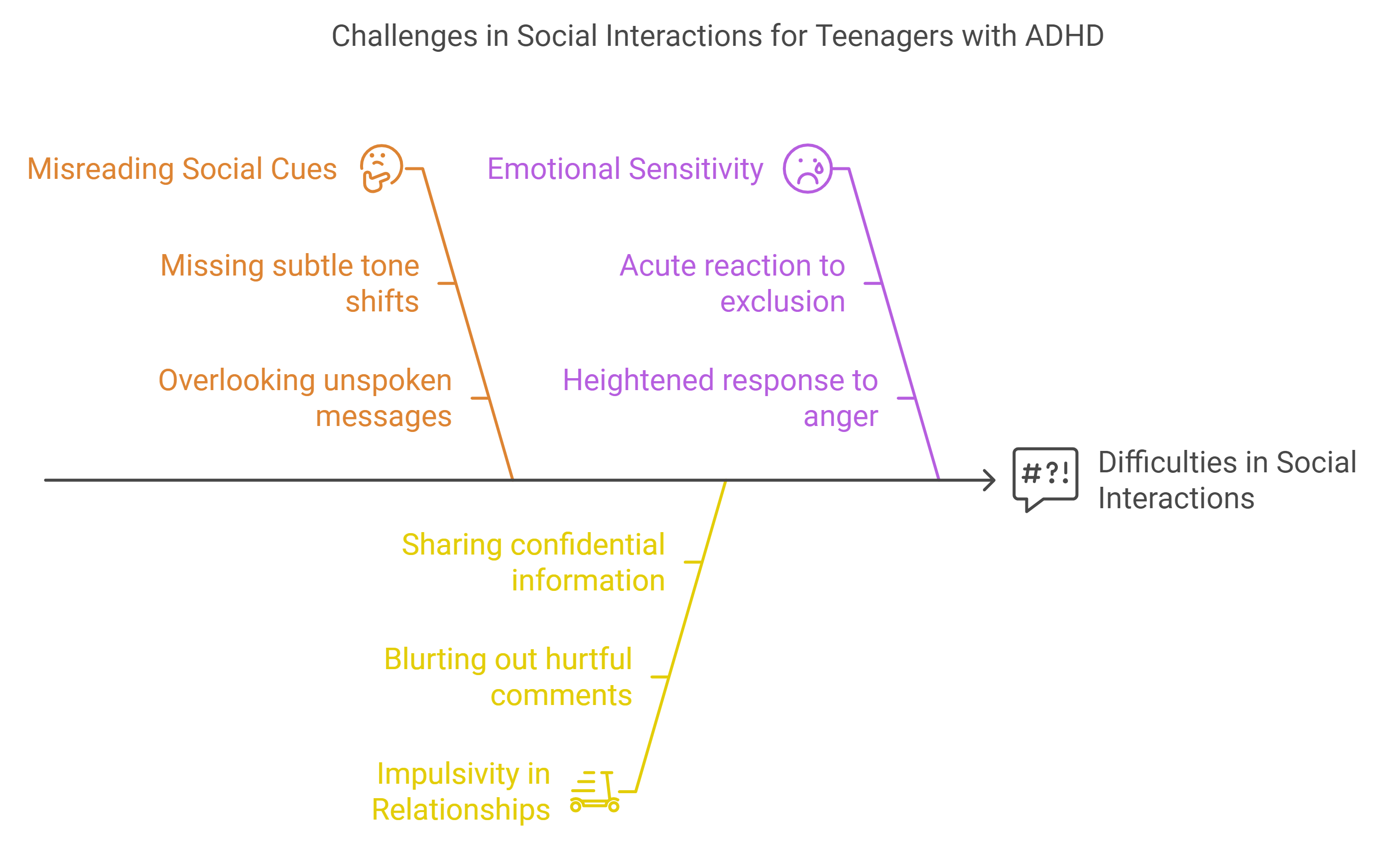
Academic Demands and Growing Expectations: The transition to high school often brings increased academic pressures, longer-term assignments, and a greater emphasis on independent learning – areas where individuals with ADHD may face considerable challenges.
-
Organization and Time Management: Keeping track of multiple assignments, deadlines, extracurricular activities, and a burgeoning social life can feel overwhelming. Imagine a backpack overflowing with crumpled papers, a locker that resembles a black hole where assignments disappear, and a constant sense of playing catch-up.
-
Sustaining Motivation and Combating Procrastination: Staying engaged in subjects that don't spark their interest can feel like an impossible feat. Procrastination often becomes a coping mechanism, leading to last-minute cramming, increased stress, and a sense of never quite measuring up.
Creating supportive structures, both at home and in school, can help teenagers with ADHD navigate these challenges. This might involve:
-
Breaking down large tasks into smaller, more manageable steps
-
Using visual aids like calendars, checklists, and colour-coded folders to improve organization
-
Seeking out teachers and mentors who understand ADHD and are willing to provide extra support
-
Exploring assistive technologies that can aid in focus, organization, and time management
Adulthood: Juggling Roles, Seeking Balance
Adulthood ushers in a new chapter filled with possibilities and complexities. For many adults with ADHD, it's a time of both triumphs and tribulations as they navigate the multifaceted demands of careers, relationships, finances, and often, parenthood.
The Workplace: A Balancing Act of Strengths and Challenges: Many adults with ADHD possess incredible talents. They're often:
-
Creative thinkers
-
Innovative problem-solvers
-
Passionate and driven individuals
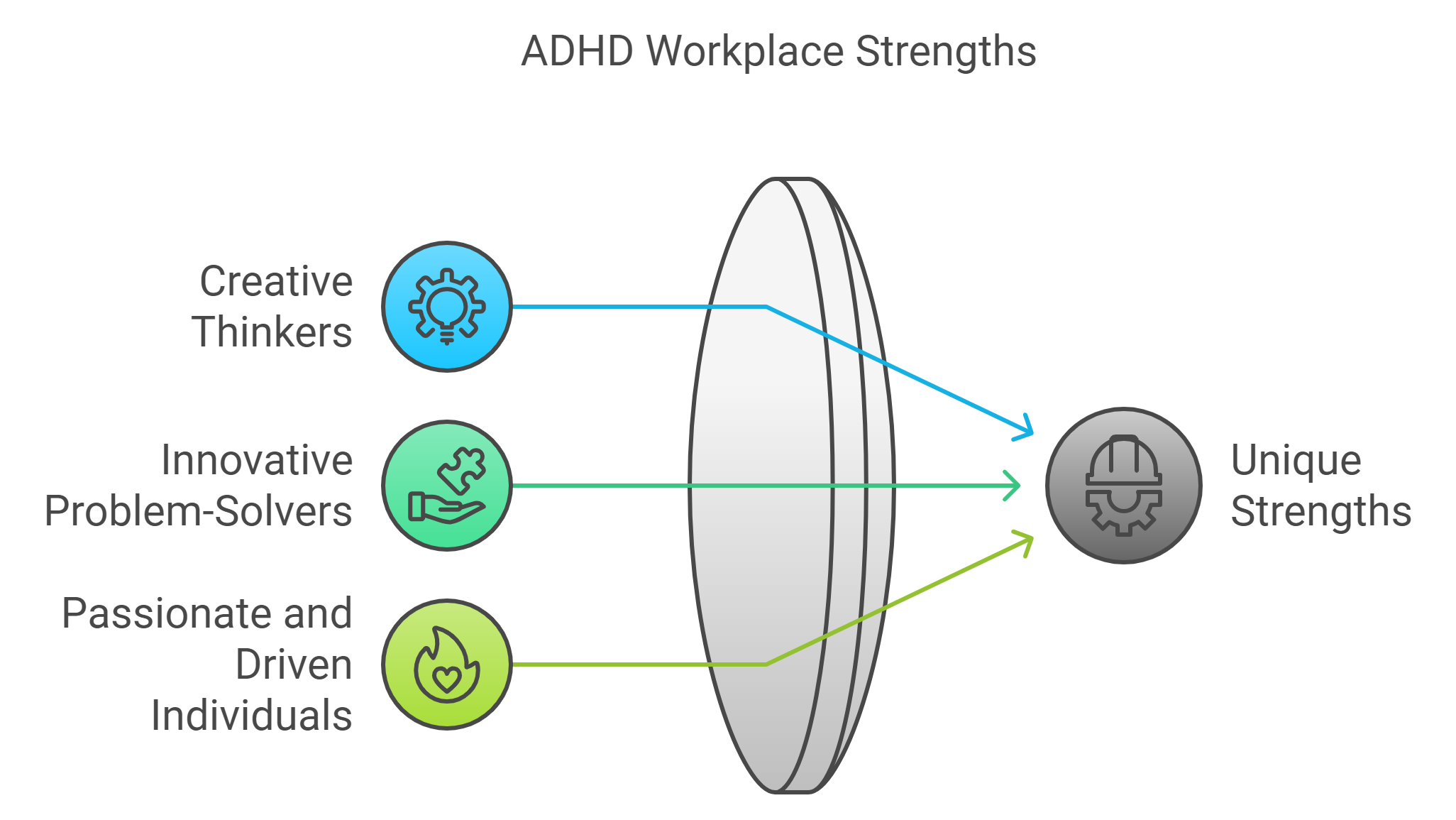
However, the traditional work environment, with its emphasis on structure, sustained attention, and meeting deadlines, can present significant hurdles.
-
Managing Time and Meeting Deadlines: Imagine a to-do list that seems to grow longer by the minute, a constant stream of emails demanding attention, and a nagging sense of never having enough time to accomplish everything. Prioritizing tasks, staying focused, and following through to completion can feel like a monumental effort.
-
Organization and Detail-Oriented Tasks: Imagine a desk overflowing with paperwork, files scattered haphazardly, and a sense of being buried under a mountain of details. For adults with ADHD, tasks that require sustained attention to detail, meticulous organization, and a systematic approach can be particularly draining.
-
Interpersonal Challenges in the Workplace: Impulsivity, a hallmark of ADHD, can impact workplace relationships. Imagine interrupting a colleague during a meeting, blurting out a comment without thinking, or struggling to follow through on commitments. These actions, while often unintentional, can create tension and erode trust, hindering career advancement.

Relationships: The Quest for Connection and Understanding: Building and maintaining fulfilling relationships requires effective communication, empathy, and a willingness to compromise – areas where adults with ADHD may face unique challenges.
-
Emotional Regulation: Individuals with ADHD often experience emotions more intensely. A seemingly minor disagreement with a loved one can escalate quickly into a heated argument due to difficulty regulating emotional responses. This can lead to feelings of being misunderstood, judged, or overly sensitive.
-
Inattention and Active Listening: Imagine your partner sharing a heartfelt story about their day, but your mind drifts to the upcoming deadline at work or the errands you need to run. Inattention, even if unintentional, can make loved ones feel unheard, unimportant, and frustrated.
-
Differing Perceptions of Time, Responsibilities, and Organization: Conflicting approaches to time management, organization, and household responsibilities can create tension, especially for couples where one partner has ADHD and the other doesn't. Imagine one partner feeling overwhelmed by clutter while the other doesn't perceive it as an issue, leading to arguments about cleanliness and consideration.
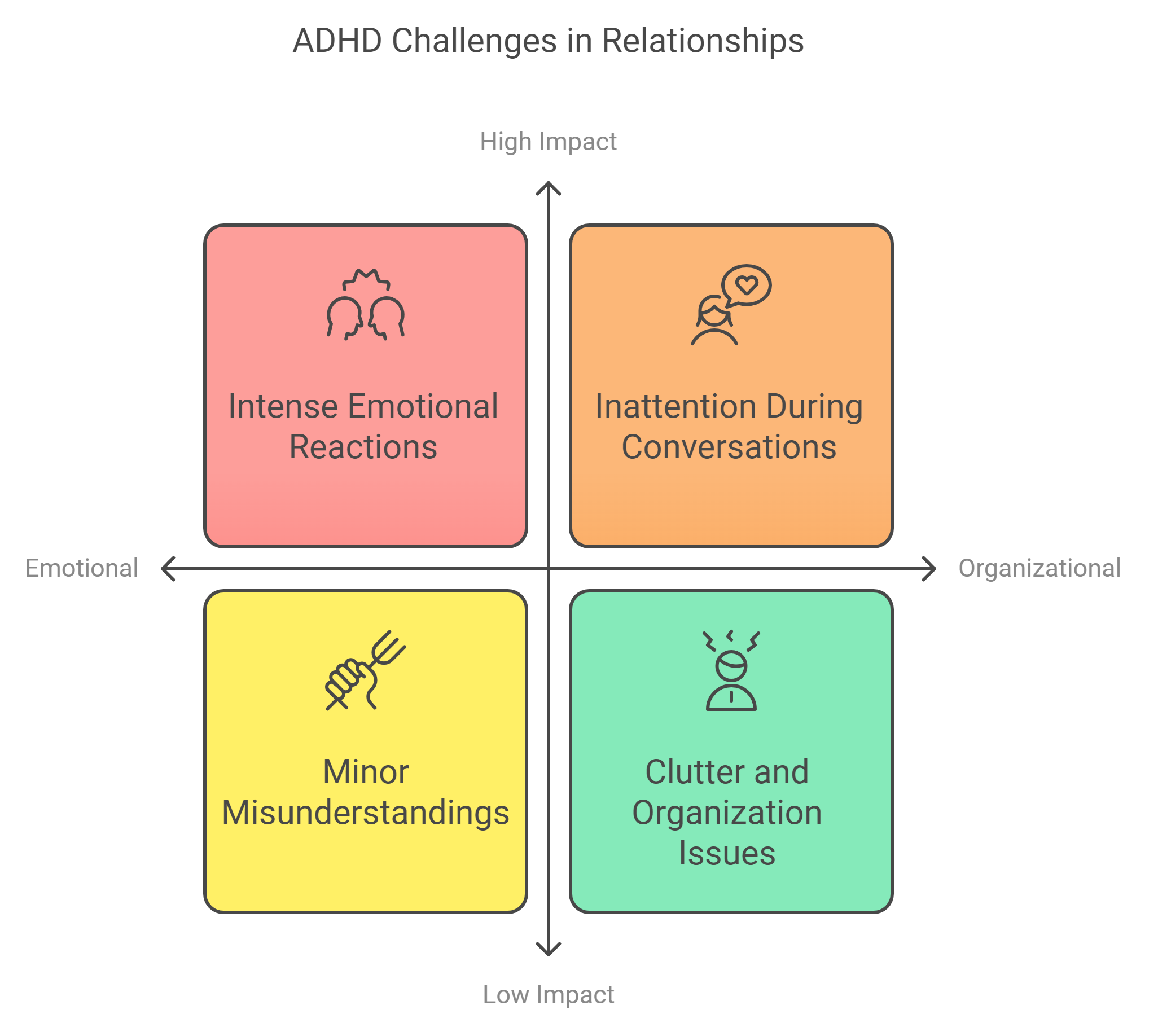
Parenting with ADHD: Navigating a Shared Journey: Parenting, a demanding role requiring patience, organization, and the ability to juggle multiple responsibilities, presents unique challenges for adults with ADHD.
-
Structure and Routine: Establishing consistent routines and maintaining structure can be challenging, yet these are often the very things that help children with ADHD thrive. Finding a balance between flexibility and consistency can be a constant juggling act.
-
Emotional Regulation: Responding to a child's tantrum with patience and understanding while simultaneously feeling your own emotions rise can be particularly challenging for adults with ADHD. It requires a conscious effort to regulate emotional responses and model healthy coping mechanisms.
-
Empathy and Understanding: On the flip side, adults with ADHD are uniquely positioned to understand the challenges their children face, offering a level of empathy and support that stems from shared experiences. They can become powerful advocates for their children, guiding them toward resources, accommodations, and a sense of self-acceptance.

Thriving in Adulthood: Strategies for Success: While the challenges are real, it's essential to remember that adults with ADHD can and do lead successful and fulfilling lives. The key often lies in:
-
Seeking Professional Support: Therapists and counsellors can provide invaluable support in understanding ADHD, developing coping mechanisms, improving communication skills, and addressing co-occurring conditions such as anxiety and depression.
-
Exploring Medication: Medication can be a valuable tool for managing ADHD symptoms, improving focus, reducing impulsivity, and enhancing executive functioning. It's essential to consult with a healthcare professional to determine the best course of treatment.
-
Embracing Coaching: ADHD coaches can help individuals develop practical strategies for improving organization, time management, goal setting, and accountability. They provide support, encouragement, and a structured approach to tackling everyday challenges.
-
Creating Supportive Environments: Sharing your experiences with trusted friends, family members, or a support group can provide a sense of belonging, reduce feelings of isolation, and foster understanding.
-
Celebrating Strengths: Focus on your unique talents and passions. ADHD brains are often wired for creativity, innovation, and a thirst for knowledge. Find outlets that allow your strengths to shine, whether it's through hobbies, volunteer work, or a career that ignites your passions.
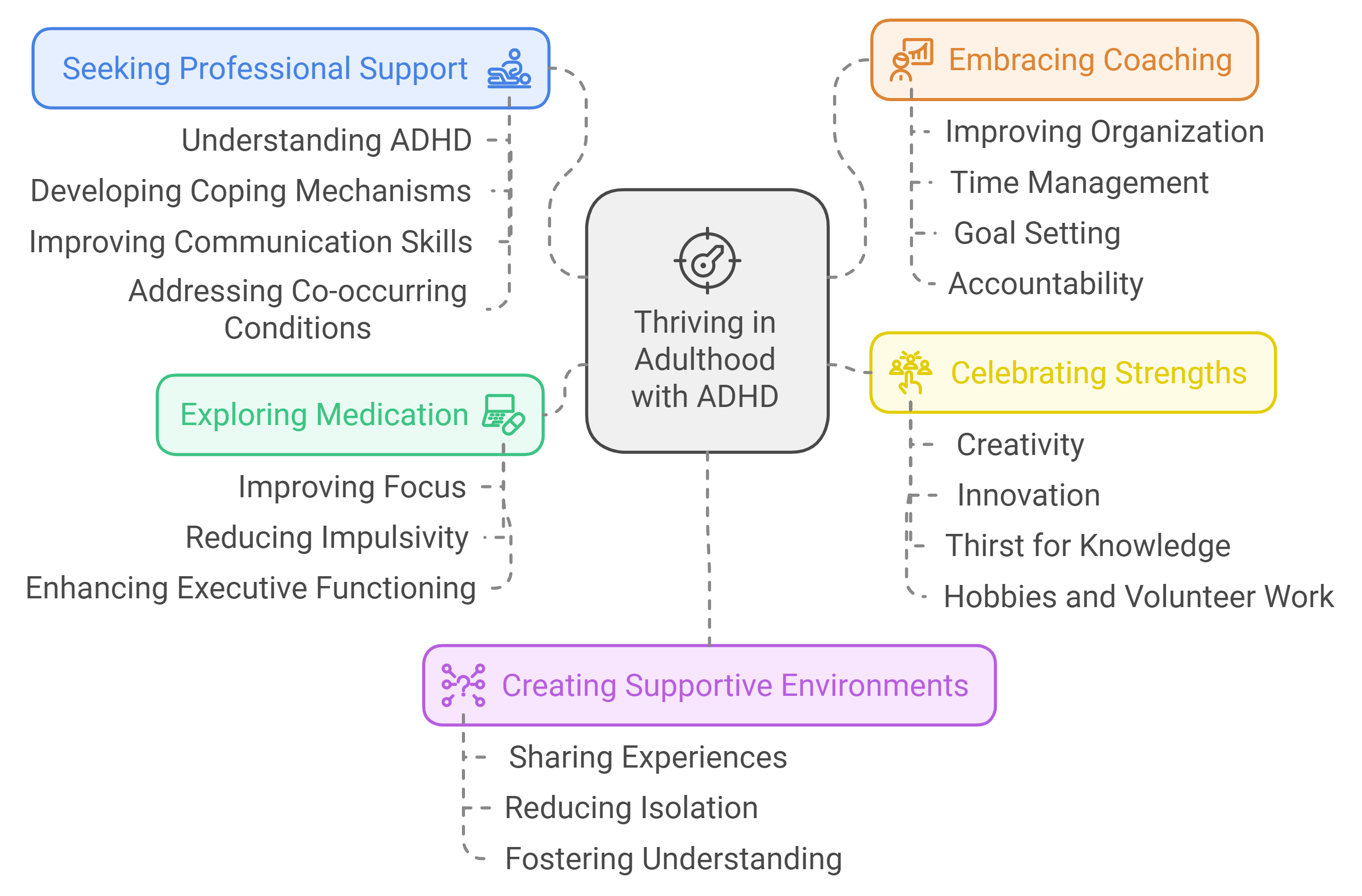
Beyond Labels and Statistics: Embracing Neurodiversity
It's crucial to remember that ADHD is not a one-size-fits-all condition. It's a spectrum disorder, with individuals experiencing a wide range of symptoms and severities.
-
Embrace Neurodiversity: Shifting from a deficit-based view of ADHD to one that embraces neurodiversity is paramount. ADHD is not a flaw to be fixed but a different way of experiencing the world.
-
Focus on Strengths: Individuals with ADHD often possess incredible talents, including:
-
Creativity
-
Innovation
-
Energy
-
Enthusiasm
-
The ability to hyperfocus
-
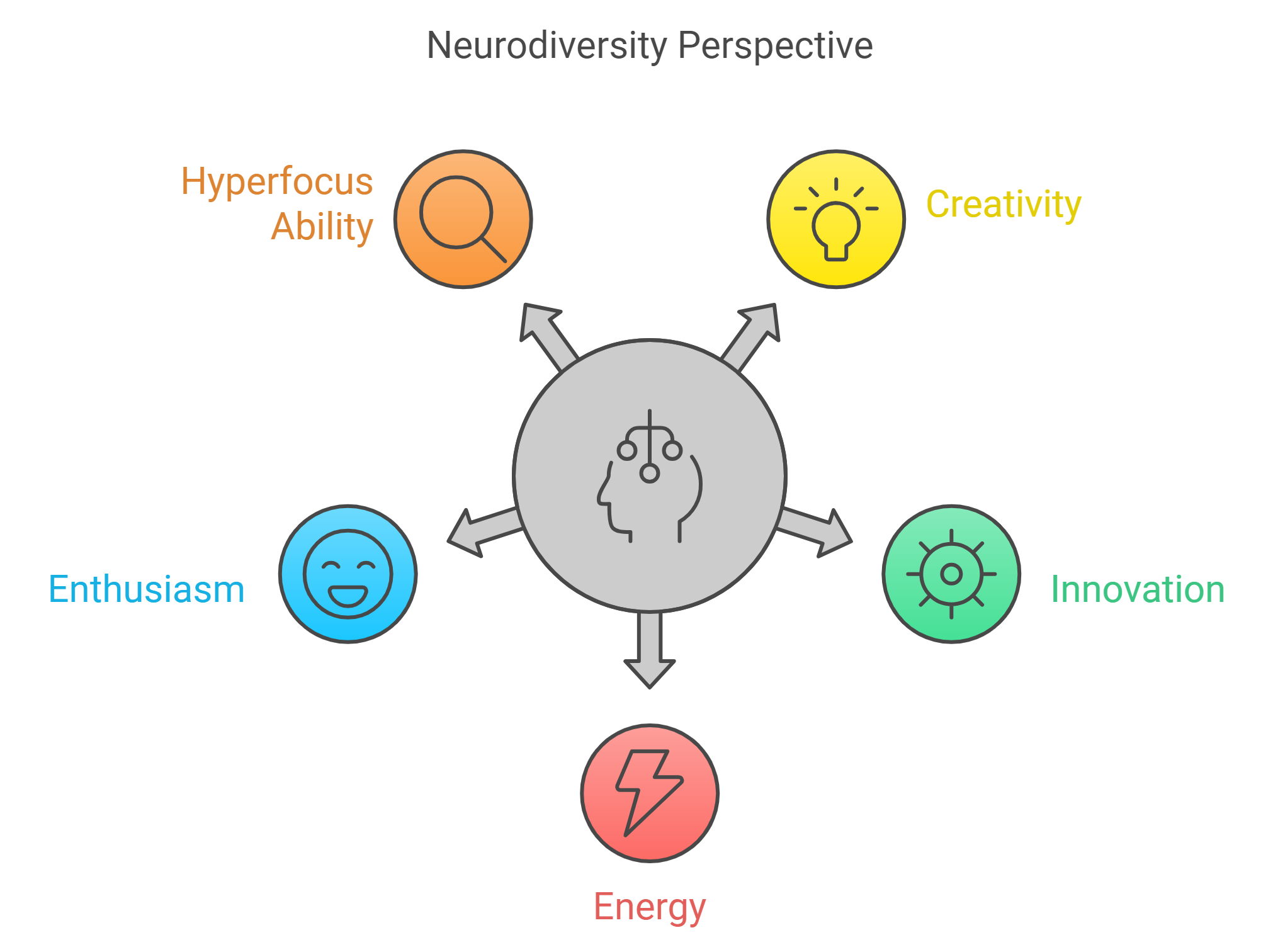
By fostering self-awareness, celebrating strengths, and creating supportive environments, we can empower individuals with ADHD to thrive throughout their lifespan.
Conclusion: A Lifelong Journey of Growth and Self-Discovery
Living with ADHD is a lifelong journey, a continuous process of learning, adapting, and discovering what works best. It's about:
-
Challenging Misconceptions
-
Embracing Strengths
-
Seeking Support
-
Advocating for Needs
With understanding, compassion, and the right tools, individuals with ADHD can navigate life's complexities with resilience, creativity, and a profound sense of self-acceptance. Their stories, woven with threads of both challenges and triumphs, remind us that true success lies not in conforming to a single standard but in embracing the richness and diversity of human experience.

